Chronotropes - Study guides, Class notes & Summaries
Looking for the best study guides, study notes and summaries about Chronotropes? On this page you'll find 29 study documents about Chronotropes.
Page 3 out of 29 results
Sort by
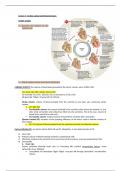
-
Lecture notes on cardiac output and blood pressure- clinical Medicine
- Class notes • 9 pages • 2024
-
- $11.15
- + learn more
This document covers all the learning objectives on lecture 1 in Clinical Medicine Cardiology. It entails details of the cardiac cycle, cardiac output and factors affecting it. It also outlines how the heart is regulated by the autonomic nervous system. Finally, it explains how blood pressure works, contributing factors and definitions of hypertension.
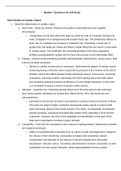
-
Module 7 Questions for Self-Study,100% CORRECT
- Exam (elaborations) • 13 pages • 2021
-
- $14.47
- + learn more
NURSING 602 Module 7 Questions for Self-Study Determinants of Cardiac Output 1. Detail the determinants of cardiac output a. Heart Rate – Beats per minute. Influenced by positive (catacholamines) and negative chronotropes. i. Temperature via the Q10 effect (the factor by which the rate of a reaction increases for every 10 degree rise in temperature) will increase heart rate. The temperature effects on heart rate are mediated via increases in metabolic rate. Importantly, a heart rate of greater...
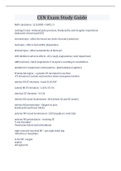
-
CEN Exam Study Guide 100% Correct
- Exam (elaborations) • 31 pages • 2023
- Available in package deal
-
- $11.39
- + learn more
CEN Exam Study Guide 100% Correct
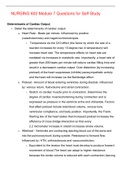
-
NURSING 602 Module 7 Questions for Self-Study,100% CORRECT
- Exam (elaborations) • 25 pages • 2021
-
- $15.49
- + learn more
NURSING 602 Module 7 Questions for Self-Study Determinants of Cardiac Output 1. Detail the determinants of cardiac output a. Heart Rate – Beats per minute. Influenced by positive (catacholamines) and negative chronotropes. i. Temperature via the Q10 effect (the factor by which the rate of a reaction increases for every 10 degree rise in temperature) will increase heart rate. The temperature effects on heart rate are mediated via increases in metabolic rate. Importantly, a heart rate o...
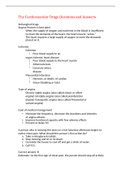
-
The Cardiovascular Drugs Questions and Answers,100% CORRECT
- Exam (elaborations) • 75 pages • 2023
-
- $15.99
- + learn more
The Cardiovascular Drugs Questions and Answers Antianginal Drugs Angina Pectoris (chest pain) When the supply of oxygen and nutrients in the blood is insufficient to meet the demands of the heart, the heart muscle “aches.” The heart requires a large supply of oxygen to meet the demands placed on it. Ischemia Ischemia Poor blood supply to an organ Ischemic heart disease Poor blood supply to the heart muscle Atherosclerosis Coronary artery disease Myocardial infarction Necrosis,...
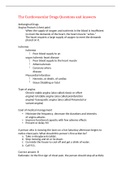
-
The Cardiovascular Drugs Questions and Answers,100% CORRECT
- Exam (elaborations) • 75 pages • 2023
-
- $16.99
- + learn more
The Cardiovascular Drugs Questions and Answers Antianginal Drugs Angina Pectoris (chest pain) When the supply of oxygen and nutrients in the blood is insufficient to meet the demands of the heart, the heart muscle “aches.” The heart requires a large supply of oxygen to meet the demands placed on it. Ischemia Ischemia Poor blood supply to an organ Ischemic heart disease Poor blood supply to the heart muscle Atherosclerosis Coronary artery disease Myocardial infarction Necrosis,...
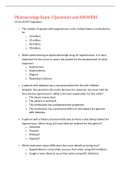
-
Pharmacology Exam 3 Questions and ANSWERS,100% CORRECT
- Exam (elaborations) • 101 pages • 2021
- Available in package deal
-
- $17.39
- + learn more
Pharmacology Exam 3 Questions and ANSWERS Ch 22-25 PPT Questions 1. The number of people with hypertension in the United States is estimated to be a. 10 million. b. 25 million. c. 50 million. d. 70 million. 2. When administering an alpha-adrenergic drug for hypertension, it is most important for the nurse to assess the patient for the development of what response? a. Hypotension b. Hyperkalemia c. Oliguria d. Respiratory distress 3. A patient with diabetes has a new prescriptio...
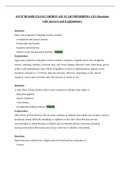
-
AGNP BOARD EXAM CARDIOVASCULAR PRESCRIBING
- Exam (elaborations) • 47 pages • 2022
-
- $46.49
- + learn more
Question: Signs and symptoms of digitalis toxicity include: constipation and muscle spasms. bradycardia and tinnitus. headache and dizziness. blurred vision and persistent diarrhea. Correct Explanation: Signs and symptoms of digitalis toxicity include: confusion, irregular pulse, loss of appetite, nausea, vomiting, diarrhea, fast heart beat, and visual changes (blurred vision, blind spots, green-yellow color disturbances, halo effect). Regardless of route of administrat...
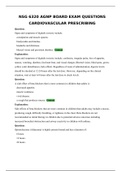
-
NSG 6320 AGNP BOARD EXAM QUESTIONS CARDIOVASCULAR PRESCRIBING-Completed A
- Exam (elaborations) • 47 pages • 2021
-
- $16.37
- + learn more
NSG 6320 AGNP BOARD EXAM QUESTIONS CARDIOVASCULAR PRESCRIBING Question: Signs and symptoms of digitalis toxicity include: constipation and muscle spasms. bradycardia and tinnitus. headache and dizziness. blurred vision and persistent diarrhea. Correct Explanation: Signs and symptoms of digitalis toxicity include: confusion, irregular pulse, loss of appetite, nausea, vomiting, diarrhea, fast heart beat, and visual changes (blurred vision, blind spots, green-yellow color...

Did you know that on average a seller on Stuvia earns $82 per month selling study resources? Hmm, hint, hint. Discover all about earning on Stuvia


